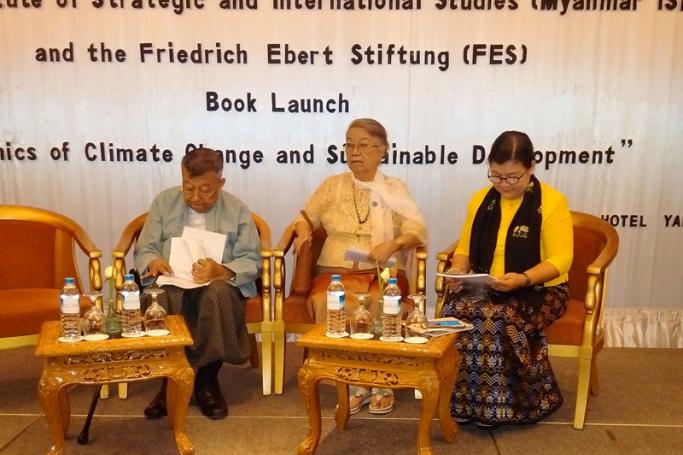Myanmar's environmental degradation is cause for much worry, said environmentalist Dr Kyi Kyi Hla, at the launch of her book "The Ethics of Climate Change and Sustainable Development: A Myanmar Perspective".
"But the battle to protect our environment cannot be fought and won by any nation alone," she told Mizzima after the launch at Yangon's Sedona Hotel.
When asked about the immediate impact of climate change on Myanmar, she said: " Not only does this threaten loss of great natural resources but also brings with it the threat of climate refugees."
Kyi Kyi Hla said many countries like Maldives might lose almost all the islands to rising sea levels, but even countries like Bangladesh and Myanmar face that threat.
"That will bring waves of climate refugees rushing for shelter and livelihood inland, causing a huge crisis," she said.
Her book, a 78-page monograph, raises concerns about the destruction of the mangrove ecosystems.
"The mangrove forests in Myanmar's Ayeyarwady Delta declined by nearly two-thirds between 1978 and 2011," the book says.
"The loss of mangrove cover means that the coastal areas will be more vulnerable to disasters like Cyclone Nargis, which killed 138,000 people in 2008."
The book says that mangrove tree coverage stood at 50 percent of the coastal areas, but only 20 percent saw sustainable growth, while 30 percent was over-exploited.
It said that the Chinese demand for Myanmar teak is driving an illegal timber trade running into tens of millions that have accelerated the loss of Myanmar's forest cover, which has doubled since 2009.
Myanmar's forests are declining at a rate of 2 percent per year, the book said.
Forest depletion annually stood at 97000 hectares before 2009 but is now up to 185000 hectares per year, primarily due to the illegal timber trade with China.
Commenting on the book, water management expert Prof Khin Ni Ni Thein said the book provided 'timely and realistic solutions' because it drew on ethics and religious values from Buddhism and Hinduism to promote conservation of nature.
She said: "Myanmar is in transition and that has led to changing consumption patterns, climate change and population growth. That has led to a rapid increase of economic activities causing a rise in local water demand by 100% or more and energy demand by 80 to 100%."
Prof Khin Ni Thein pointed to Myanmar's rapid development of special economic zones and agriculture expansion as the cause of a sharp rise in water and energy demand.
Heavy dependence on the available water resources for energy and food security will undermine the sustainability of the ecosystems, she said.
"Hence a series of conflicts may cause crisis and instability if we do not put in place Good Water Governance," she said.
The book release was organised by Myanmar Institute of Strategic and International Studies (MISIS) and Freidrich Ebert Stiftung's Myanmar office.
You are viewing the old site.
Please update your bookmark to https://eng.mizzima.com.
Mizzima Weekly Magazine Issue...
14 December 2023
New UK Burma sanctions welcome...
13 December 2023
Spring Revolution Daily News f...
13 December 2023
Spring Revolution Daily News f...
12 December 2023
Spring Revolution Daily News f...
11 December 2023
Spring Revolution Daily News f...
08 December 2023
Spring Revolution Daily News f...
07 December 2023
Diaspora journalists increasin...
07 December 2023
Euromoney Myanmar Global Investment Forum begins in Nay Pyi Taw












